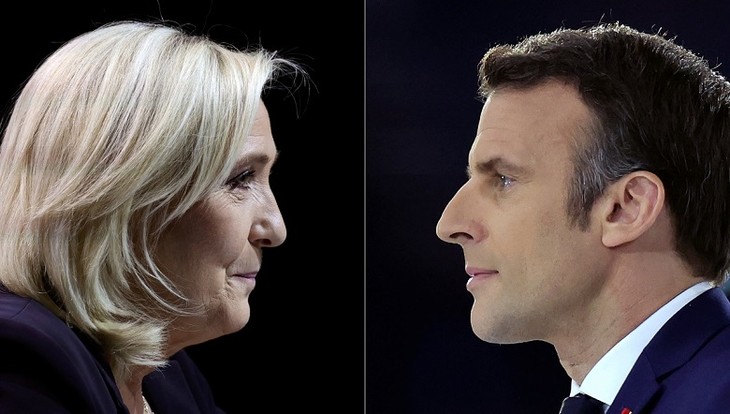(VOVWORLD) - The French Presidential election has drawn attention of the international community, especially the European public. Its results will have direct impact on France's foreign policy and on Europe in general.
 Incumbent President Emmanuel Macron (R) and far-right leader Marine Le Pen (L) (photo: Reuters) Incumbent President Emmanuel Macron (R) and far-right leader Marine Le Pen (L) (photo: Reuters) |
Official results of the 1st round of the French Presidential election announced by the Interior Ministry on Monday showed that incumbent President Emmanuel Macron won 27.85% of the votes, while far-right leader Marine Le Pen received 23.15%. The results allowed both candidates to advance to the 2nd round of voting scheduled on April 24th, a rematch of the race between the two main opponents in the election five years ago.
Tight race
With a small ballot margin, the 2nd round of the current presidential election is said to be much more unpredictable than in 2017. In the last election, centrist Macron won a landslide over Le Pen by 66% to 34% margin.
Public polls conducted right after the 1st round of voting showed that incumbent President Macron has a slim chance to win over Le Pen. An Ifop-Fiducial poll showed Macron with just a slight edge of 51 percent in the run-off compared to Le Pen's 49 percent, with a margin of error of three percentage points. Separate polls by Ipsos-Sopra Steria and Opinion Way both put Macron at 54 percent against 46 percent for Le Pen.
Analysts say that the upcoming voting results will be better predicted after a live-televised debate on April 20th. Yet, the final result can only be known after the votes are counted in the presidential runoff set for April 24th.
Impacts and challenges
The French presidential election draws special attention because its results may lead to significant changes in France’s external policies and within the EU. Before Britain leaving the EU in 2021, France, Germany, and Britain were three locomotives of the EU. After Brexit was accomplished, Germany and France have taken the lead in the EU.
Le Pen said that she wants to reconstruct the EU and pull France out of the US-led NATO integrated command structure. Meanwhile Macron said he wants “a France that is part of a strong Europe and that continues to forge alliances with the major democracies to defend itself."
The winner will face great challenges internally and externally. Regarding foreign affairs, the top challenge is to handle France’s current complicated relation with Russia amid its relations with major world entities including the EU, the US, and China while the Russia-Ukraine crisis is heaving huge impacts on Europe. Internally the incoming President will have to foster the economic recovery which has been adversely affected by COVID-19 and the Russia-Ukraine crisis.